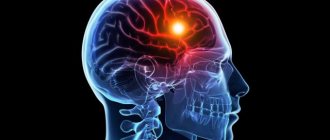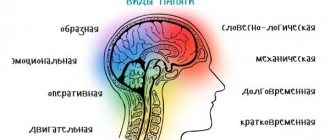Human memory is a certain property of the brain when it can store and reproduce information. Those who have excellent memory are the real lucky ones. After all, it’s easy for them to remember various events, important dates and other necessary information. However, it often happens that memory deteriorates. And then they try to restore and improve it in order to continue to feel like a full-fledged independent unit.
- What causes memory impairment?
- Diet to improve memory
- Brain training and memory skills
- Folk ways to restore memory
- Medicines: what is the peculiarity of their use
What causes memory impairment?
When solving the problem of how to restore memory, you need to understand the reasons that caused the problem. The list includes:
- head injury;
- taking a number of medications, both to treat certain diseases and self-selected ones (for example, sedatives);
- taking harmful and illegal drugs (alcohol or drugs);
- the person’s age (in this case, the vessels become clogged with fatty deposits);
- stress, nervous experiences;
- overwork, especially chronic;
- pollution of the body (poor nutrition, lack of proper physical activity).
Most problems are quite easily corrected and do not always require treatment with special drugs. Difficulties can arise only as a result of injury and with aging changes, when the walls of blood vessels thicken and the nutrition of the nervous tissue deteriorates. In these situations, memory restoration can take quite a long time and will not always show an ideal result.
Child's memory
With regular and sufficient sleep, feasible physical activity, proper nutrition and the absence of stress and conflicts in the family and school, a healthy child should not have problems with memory. After all, it is at an early age that neuroplasticity - the ability of the brain to adapt to our requirements - is better developed in children than in adults.
However, at primary school age, the ability to concentrate attention for a long time and logical thinking are still poorly developed, so first of all you should pay attention to their training. Moreover, this should be done in an unobtrusive playful manner. To support your child’s desire to learn new things, you should definitely show him how to use new knowledge in everyday life or play.
At primary school age, the ability to concentrate attention for a long time and logical thinking are still poorly developed, so first of all you should pay attention to their training
It is possible to improve memory and brain function in a child with the development of at least two of the three main channels - auditory, motor and visual. Children who can visualize what they hear and present it in “pictures” also easily master new knowledge. It’s great if visual examples are used for learning: toys or drawings.
Advice! Excessive brain tension is perceived by the body as violent, and it immediately turns on a defensive reaction in the form of drowsiness, headaches, etc. Therefore, the number of activities with a child should be strictly proportionate to his age.
Diet to improve memory
Most often, to begin with, it is suggested to treat memory with nutritional correction. It has been proven that those who diet and deprive themselves of many nutrients suffer from problems with concentration and note a decrease in memory abilities.
Experts advise adding more foods containing vitamin E to your diet. These help restore nerve cells, ensure proper nutrition of the brain, and normalize the state of the nervous system. Treating the brain with products is quite simple. You just need to include eggs, seeds and nuts, bran bread, cereals, and green leafy vegetables in your diet. You should also take care to increase the diversity of your diet with seafood, which contains a lot of iodine.
To improve brain function, it is worth adding foods rich in zinc to your diet. Of course, treatment of this kind will be many times more pleasant than one that requires you to swallow pills.
Brain training and memory skills
Experts answering the question: how to restore memory, say that it needs to be trained regularly. Moreover, those who are horrified by such a procedure do it completely in vain. After all, the training is quite simple and does not require any special effort.
So an excellent option, which can be characterized as treatment, is the usual memorization of texts. Prose, poetry - it doesn’t matter at all what exactly you try to remember. However, it is worth understanding that simple memorization is not enough here. The text must be carefully read, broken down into images, thought about, evaluated, and given certain anchors to these images. Then memorization will go faster and better.
You can also treat memory with associations. The principle of this method is quite simple. We must act as in the fairy tale about the rainbow and the hunter, when each color is assigned a specific word. This method is good for memorizing rules, mathematical formulas (for example, Pythagorean pants illustrate this technique very well) and much more. It is entirely possible to use both ready-made association options and select your own.
An excellent solution to the problem would be the photography method. It is enough to sit down, relax, choose an object and look at it intently for about 5 seconds. For the next 5 seconds, close your eyes and bring to mind the image that you just “photographed.” It is best to perform treatment with this method several times a day, choosing different objects to remember.
You can also treat memory gaps with the help of smells. Scientists have long proven that smell is one of the most powerful memory tools. With its help, it is quite possible to recall even the deepest memories. So, scientists say that if you study certain information and at the same time inhale a certain aroma, for example, toothpaste, and then take it with you to the exam and inhale a little, this will trigger active memories.
Benefits of sleep
With a lack of sleep, the entire body suffers. But its absence has a particularly painful effect on the brain. After all, it is during sleep that the information received during the day is analyzed and processed. Without proper sorting and processing, the brain will simply be unable to perceive something new.
With constant lack of sleep, a person’s performance quickly declines. If night waking occurs regularly, this can even result in serious functional diseases, including mental and psychomotor disorders.
You should choose a warm, darkened room to sleep. The habit of going to bed at the same time every day has a beneficial effect on rest - in this case, falling asleep occurs without difficulty. It should be preceded by a calm, relaxing environment. Taking a warm, relaxing shower, reading a good book, etc. has a beneficial effect on falling asleep.
The habit of going to bed at the same time every day has a beneficial effect on rest - in this case, falling asleep occurs without difficulty
Advice! The duration of sleep is individual for each person. Moreover, excess sleep is just as harmful as its lack. But if you feel groggy even after 7-8 hours of good sleep, try revising your routine and increasing its duration by at least half an hour. Longer sleep is also required in case of intense physical or mental work.
Folk ways to restore memory
There are also a number of folk methods that are widely used to restore memory capabilities. For example, herbal medicine is recommended. It is enough to consume infusions of various herbs, which are responsible for normalizing brain activity and also calming the nervous system. The method of brewing the herb is prescribed on the packaging of the medicine.
As an option, you can use breathing exercises. It is done quite simply. So, for example, you need to close one nostril with your finger, then inhale air through the free one and hold your breath (for a short time). Exhale through the one that was closed, while closing the nostril through which you inhaled. Active breathing allows you to ensure the flow of oxygen to the brain, resulting in normal blood circulation.
How to strengthen your memory: 7 useful tips.
Use computer games.
Games on the computer are not always bad; they develop attentiveness. But you shouldn’t abuse it – 1 hour a day is enough. It is better to choose games aimed at developing logic, strategy, and tactics.
Work with numbers.
Many people last encountered arithmetic at school. But numbers surround us every day (prices, numbers, time) and can make the mind work. To do this, you should remember the multiplication table and practice counting quickly in your head (for example, while shopping).
Learn new skills.
The benefits of this practice are considerable. Firstly, this is an opportunity to develop comprehensively; you can fulfill a childhood dream or master a skill that you have long wanted to learn. For example, a person who works with numbers would do well to master a musical instrument or learn painting.
By mastering hobbies that directly contradict our profession, we use both hemispheres of the brain, which means we force it to work harder. Secondly, a hobby develops attentiveness and helps you concentrate on new details.
Don't stick to a strict diet.
Those who want to lose weight should take into account that a small amount of protein, fiber, and carbohydrates not only reduces weight, but also impairs memory. You should always remember that the brain needs a balanced diet, and the absence of certain components leads to its depletion.
It's good to have breakfast.
Breakfast is an essential part of the diet, a boost of strength for the whole day. The brain burns a lot of calories overnight and needs to be restored. If this is not done, absent-mindedness, drowsiness, and unjustified fatigue will appear.
Listen to music.
The sound vibrations of musical compositions cause brain waves and simulate the functioning of the brain. The best music for memorization is classical.
Think positively.
Negativity, apathy and fatigue always affect the nervous system, which is directly connected to the brain. To ensure productive work, you need to concentrate on positive things, set yourself a positive attitude in the process of memorization.
Take a personality type test
Medicines: what is the peculiarity of their use
Today there are quite a large number of special medications that are prescribed to people when they develop symptoms of memory loss. These include:
- Vitrum memory;
- Glycine;
- Phenibut and others.
The only thing worth remembering is that such drugs must be prescribed only by a specialist: a neurologist. After all, they most often have a certain effect on the brain. This means that if prescribed incorrectly and the dosage chosen incorrectly (without taking into account the severity of the problem), there is a risk of seriously worsening your condition.
Types of amnesia
Types of amnesia are distinguished by the speed of its appearance, forgotten skills, prevalence, duration and by those events that have disappeared from the head:
By duration
Memory loss is divided into short-term, when amnesia is observed for a short period of time, and long-term. In the second case, a person’s memories are lost for a long time.
By prevalence
Amnesia can be partial, when minor fragments of memories have been lost, and complete, when all memories have been lost.
For events lost from memory
The described problem is classified as retrograde and anterograde . The retrograde form is the loss of memories of what happened before the cause of the disease appeared.
Memory loss in older people belongs to this type of illness. It happens if a person is diagnosed with Pick's disease, Alzheimer's disease, or toxic encephalopathy.










